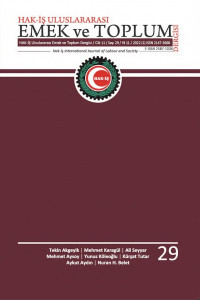BİR HİPER ESNEK İSTİHDAM TÜRÜ OLARAK ‘SIFIR SÜRELİ SÖZLEŞME’: AKIŞKANLARDAN GAZLARA GEÇİŞ Mİ?
Sıfır Süreli Sözleşme, ‘Ve Çağı’, Esnek İstihdam, Ulrich Beck
-
-,
___
- KAYNAKLAR
- AKYİĞİT, Ercan (2003). İş Hukuku, Ankara: Seçkin
- BBC News Business (2014). What are zero-hours contracts?, http://www.bbc.com/news/business-23573442, erişim tarihi: 27/08/2014
- BBC News UK (2013a). Zero-hours contract workers happy, survey suggests, http://www.bbc.com/news/uk-25098984, erişim tarihi: 27/08/2014
- BBC News UK (2013b). Viewpoints: Are zero-hours contracts exploitative?, http://www.bbc.com/news/uk-24017011, erişim tarihi: 27/08/2014
- BECK, Ulrich (2001). Interview with Ulrich Beck, Journal of Consumer Culture, 2001; 1; 261
- BECK, Ulrich (2005). Siyasallığın İcadı, Çev. Nihat Ülner, İstanbul: İletişim
- BECK, Ulrich (2011). Risk Toplumu: Başka Bir Modernliğe Doğru, Çev. Kazım Özdoğan – Bülent Doğan, İstanbul: İthaki
- BERKHAOUT, Ernest, Arjan Heyma, Jurriaan Prins (2013). Flexibility @work 2013: yearly report on flexible labor and employment, Amsterdam: Randstad
- BUDD, John W. (2011). The Thought of Work, NY: Cornell University Press
- CBI (2011). Navigating choppy waters: CBI / Harvey Nash employment trends survey 2011, London: CBI
- CHAN, Jenny (2013). A suicide survivor: the life of a Chinese worker, New Technology, Work and Employment, 28:2
- CIPD (2012). Flexible working provision and uptake, London: CIPD
- CIPD (2013a). Zero-hours contracts: understanding the law, London: CIPD
- CIPD (2013b). Zero-hours contracts: Myth and reality, London: CIPD
- CIPD (2014). CIPD welcomes Labour party proposals on zero hours contracts but warns that some recommendations go too far, Web: http://www.cipd.co.uk/pressoffice/press-releases/labour-zero-hours-contracts-recommendations-250414.aspx, erişim: 27/08/2014
- DERELİ, Toker (2014). Flexicurity and Turkey’s New Labor Act: Problems and Prospects, Labor and Emplyment Relations in a globalized World: New Perspectives on Work, Social Policy and Labor Market Implications, Edts. Toker Dereli, Y. Pınar Soykun-Sarıca, Aslı Şen-Taşbaşı, Cham: Springer
- EUROSTAT (2014). Employment Statistics, http://epp.eurostat.ec.europa.eu/statistics_explained/index.php/Employment_statistics, erişim tarihi: 25.08.2014
- MARX, Karl ve Friedrich Engels (2005). Komünist Parti Manifestosu, Çev. Yılmaz Onay, İstanbul: Evrensel
- MCTAGUE, Tom (2013). Ed Miliband to abolish zero-hour contracts for 5.5million workers, Mirror, 09/09/2013, http://www.mirror.co.uk/news/uk-news/ed-miliband-abolish-zero-hour-contracts-2261193, erişim tarihi: 27/08/2014
- MİLİBAND, Ed (2014). Ending the abuse of zero-hours contracts, Web: http://www.labour.org.uk/ending-the-abuse-of-zero-hours-contracts, erişim: 27/08/2014
- MONNİER, Christine (2013). Precarious Labor, Sociology of Work: An Encyclopedia, Ed. Vicki Smith, LA: Sage
- NEVİLLE, Simon (2014). Sports Direct: 90% of staff on zero-hour contracts, The Guardian, 28/07/2014, http://www.theguardian.com/business/2013/jul/28/sports-direct-staff-zero-hour-contracts, erişim tarihi: 28/08/2014
- NİENHUESER, Werner (2005). Flexible Work = Atypical Work = Precarious Work? Introduction to the Special Issue, Management Revue, Vol. 16, Issue 3
- RİTZER, George (2011). Küresel Dünya, Çev. Melih Pekdemir, İstanbul: Ayrıntı
- STANDİNG, Guy (2011). The Precariat: The New Dangerous Class, London: Blo-omsbury
- ISSN: 2147-3668
- Başlangıç: 2012
- Yayıncı: Hak-İş (Hak İşçi Sendikaları Konfederasyonu)
TÜRK KİMLİĞİNİ OLUŞTURAN ORTAK KÜLTÜREL DEĞERLER
YOKSULLUĞA İNOVATİF BİR ÇÖZÜM; SOSYAL GİRİŞİMCİLİK
EKONOMİK ÖZGÜRLÜKLER VE YOLSUZLUK İLİŞKİSİ: TÜRKİYE İÇİN BİR ZAMAN SERİSİ ANALİZİ
Merter AKINCI, Gökhan ERKAL, Ömer YILMAZ
BİR HİPER ESNEK İSTİHDAM TÜRÜ OLARAK ‘SIFIR SÜRELİ SÖZLEŞME’: AKIŞKANLARDAN GAZLARA GEÇİŞ Mİ?
OSMANLI KADINININ EKONOMİK HAYATA ETKİN KATILIMI: BACİYÂN-I RÛM ÖRNEĞİ
TÜRKİYE’DE SOSYAL GÜVENLİK SİSTEMİNİN DÖNÜŞÜMÜ VE BİREYSEL EMEKLİLİK SİSTEMİ
Füsun KÖKALAN ÇIMRIN, Zafer DURDU
KIDEM TAZMİNATI FONU KONUSUNDA DÜŞÜNCELER
ORTADOĞU’DA ULUSLAŞMA SORUNU ÜZERİNE BİR DENEME: MODERNLİK
AHİLİK KURUMU VE GÜNÜMÜZ ÇALIŞMA YAŞAMINDAKİ PSİKOLOJİK SORUNLARA YÖNELİK ÇÖZÜMLER
AHİLİK GELENEĞİNİN GÜNÜMÜZDE SOSYAL İÇERME POLİTİKALARINA OLABİLECEK KATKILARI
